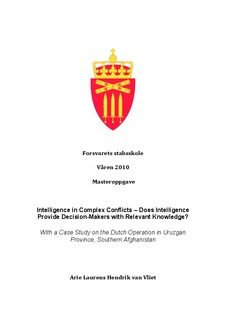Intelligence in complex conflicts - does intelligence provide decision-makers with relevant knowledge? With a case study on the Dutch operation in Uruzgan province, Southern Afghanistan
Master thesis
Permanent lenke
http://hdl.handle.net/11250/99922Utgivelsesdato
2010Metadata
Vis full innførselSamlinger
- Masteroppgaver [466]
Sammendrag
The shift from ‘industrial wars’ to the contemporary paradigm of ‘war amongst the people’ has had enormous consequences for the theory, concepts and ideas about how contemporary wars (complex conflicts) are waged. What is the impact of this paradigm shift on the role and influence of intelligence? How relevant are intelligence reports for the decision-making processes concerning these complex conflicts? The purpose of this study is to support the intelligence community in the process of making intelligence more relevant for decision making. It is aimed at creating a better understanding of the intelligence needs of complex conflicts, and at identifying bottlenecks and potential solutions. The first part of this study provides a conceptualframework by discussing relevant concepts of intelligence and complex conflicts. In the second part, the bottlenecks and potential solutions are identified. This part of the study is conducted by using a single case study - the Dutch operation in southern Afghanistan. This study shows that a culture of ‘secrecy’ and an output-driven process within the Dutch intelligence community has a negative effect on the relevance of intelligence for decision-making. It further identifies a need for a closer relationship between the decision-makers and the intelligence producers, and a more pro-active role for the latter.
